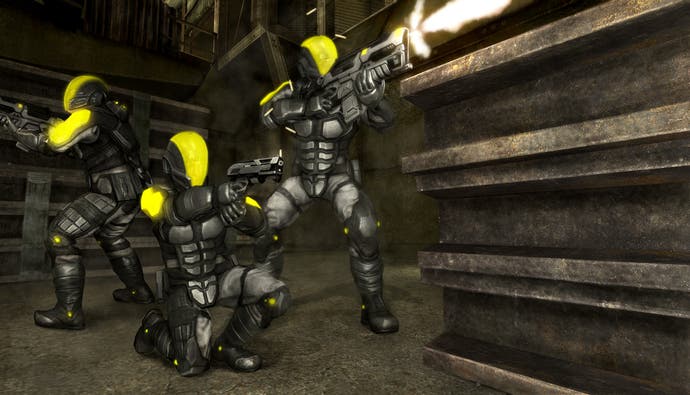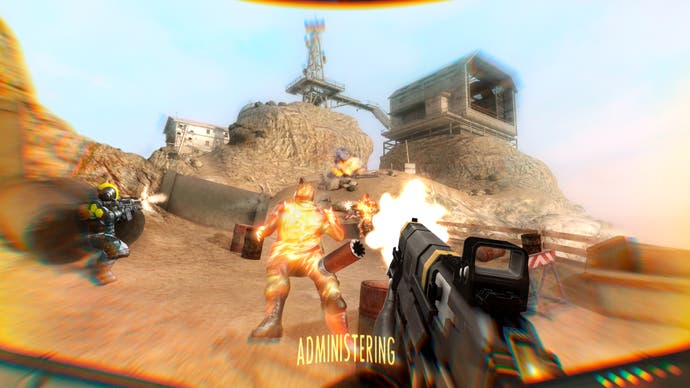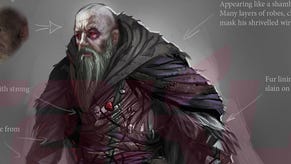David Doak talks Haze
Free Radical on PS3, FPS design and competing with Halo.
Haze is Free Radical Design's first big push on next-gen, and a recent demonstration at UbiDays suggests it's got more ideas than most. Having talked about how the game itself is put together in last week's preview, today we're offering up the rest of our chat with David Doak, during which he deals with everything from PlayStation 3 and Halo 3 to making games more emotional.
I think there's an opportunity there to create a new brand and push new IP, and basically PS3 looks like a good place to do that. There's obviously the performance - the machine's a very capable machine - and I think we're in terms of development pretty well placed to take advantage of it, because we've got the history on PlayStation 2, so we're not frightened by the things causing people a bit of alarm. That's really it. There's some strategic element to it - it's us saying, well, let's go strong with one console version of it first of all, and we may very well do other versions afterward.
We're working on development on all platforms. It's just looking at the way to best get the return on the investment of making the game. And part of that is it's a timing thing; late 2007 will be a good time to be coming out on PlayStation 3 and saying here is Free Radical's next-gen game.

There's always the kind of dynamics we're doing with the Nectar going wrong and stuff like that, and showing the deformation to the world. I think one of the strongest that you can do, and we haven't really shown much... well, any of in fact are the cut-scene, kind of script moments in the game - we do a lot of the kind of denial-and-confrontation thing where you see characters and you have a relationship with them and that relationship changes because they do unpredictable things, or they do things that make you feel uncomfortable about being associated with them. So that's one of the strongest story-telling things you can do. And particularly in first-person, it's like saying, 'you're like me; look at me, I'm doing bad things'.
It's a big challenge, and certainly more of a challenge than I thought it was going to be, doing those things in the context of a war-game. Because, you know, who's the murderer in the warzone? It's a hard thing to do, particularly in videogames where life is incredibly cheap. It's an interesting thing to try to actually address the emotions of being a soldier in an environment which is by its very nature sanitised. I think we're going to make some good steps in that direction, and I don't see anyone else trying to do it.

I've not spoken to the Colonel. I don't really want to pass comment on what those guys are doing, but I don't think they...
It's not John Wayne. And a lot of videogames are John Wayne. That said, it has to be a game where... everyone's paid their entry money to come and shoot. If halfway through I said, 'no more shooting, now it's a cake decorating game' or something, people would say, 'sorry, your game's broken, because you can't do that'. In a film you can do it, but in a game you can't do it. So in this game you're shooting at the start and shooting at the end. And we have to somehow change your opinion about that as you go through, and make you uncomfortable about it, make you pleased about it, make you upset or whatever.
It's funny, because the videogame industry almost damns itself by just going out and saying, 'hey, we're all generic and boring and we just do the same shooters all over again, and let's make another one,' which is a shame. And then people look at us and say, 'you know, you guys, you've got nothing useful to say about the world, because you're just there beating off in your little box making the same kind of thing'. I'd like to push it. I think with TimeSplitters we were also trying to push it, because we're saying, 'these shooting games - let's not take them too seriously, because it's good fun'. And some people get that and some people don't get that. It's most disappointing, when sometimes in the States people get TimeSplitters and say, 'well why's it so stupid?' Well, it's just trying to be fun.








